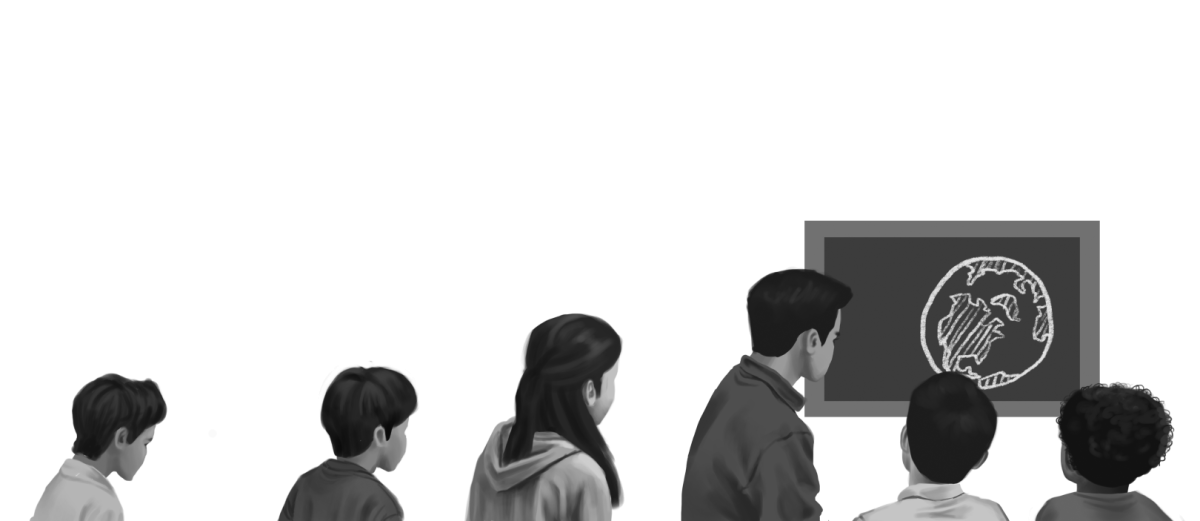Twenty percent of Palo Alto will be underwater by 2050 according to the National Oceanic and Atmospheric Administration.
While every generation since the Boomers era, which lasted from 1946 to 1964, has acknowledged climate change to be a top priority, only around 50% of people within each group have taken personal action to address the issue according to Pew Research Center.
In response to this lack of action, Ellen Fletcher Middle School adopted the Sustainability for All program in the fall of 2023 with a goal of boosting enrollment, introducing students to high school pathways and creating more environmental awareness among students.
“We’re living in a time where sustainability has become one of the paramount issues facing society,” said Todd Collins, a member of the Palo Alto Board of Education. “You see places like Stanford launch entire new schools of sustainability … so the idea [of the program] is that they [students] won’t have to wait until college … because it [climate change] is going to affect them much more than older people.”
The Sustainability for All program provides students with the opportunity to learn more about developing an environment where people have access to clean air, food and water through interactive and classroom-based activities.
Along with environmental awareness, Fletcher presented the idea of adding a specialty program to their curriculum to help increase enrollment.
“There were lots of different ideas thrown around, like adding Connections which they have at JLS [Jane Lathrop Stanford Middle School],” Jesse Ladomirak, a member of the Board of Education, said. “The Fletcher community really wanted to take on the project of figuring out, for themselves, what they were excited about and what they can creatively imagine.”
According to the Palo Alto Unified School District website, families that are interested in participating in the program but don’t live within the Fletcher district can still apply and join the school, effectively boosting the pool of students who can enroll. However, Tamara Wallace, a Teacher on Special Assignment leading the program, says that boosting enrollment is still a priority even after launching the program.
“We still have many open spots for students since we function as a choice program,” Wallace said. “We … value working with all students, so it doesn’t really matter how many students [of the program] are at Fletcher.”
The majority of this program is taught within school electives, core classes and after-school activities, made possible by collaboration with Fletcher staff, PAUSD students and parents and the District Office.
“The integration of units within core classes allows them [students] to discuss topics in their social studies classes, or read a novel in their English classes, or even deal with some data in their math classes that bring awareness to different environmental situations,” Wallace said.
The program is mandatory in elective classes, but optional in core classes where program material is occasionally integrated into the curriculum. Wallace encourages students to participate as much as possible, saying that every session can provide value to anyone.
“Sometimes they [students] have a lot of interest, and sometimes they don’t, but you learn from each [lesson],” Wallace said.
Claire Park, a seventh-grader at Fletcher and a participant of the program, agrees, saying that the work done under Sustainability for All has greatly improved the overall state of Fletcher’s campus.
“I’m in the elective so I get to plant a lot of things, and I’ve visibly noticed that the school has been cleaner,” Park said. “I’ve been having to pick up less trash around the school, and I think we’re really making a difference.”
Ava Das, another seventh-grader at Fletcher, said that even those who choose not to engage in the program still have many opportunities to participate.
“As someone who doesn’t do the elective, we have many activities at lunch,” Das said. “On Schoology, they always post activities we can do to help the environment, and also gain community service hours … or money as an incentive. So it’s more of an optional thing that you can come and join, it’s just not always in our curriculum.”
However, the program hasn’t been without its challenges.
“Being a new program, not many people signed up for it,” Das said. “A lot of students put it as their alternative, and so most people in this program didn’t originally intend to be in it.”
Still, Das says that the majority of students have enjoyed their experiences working in the program.
“Even though these people [students] are kind of forced to be in the electives, they’ve still been pretty enthusiastic [about the program],” Das said.
With the continued support of Fletcher staff, Park believes this program will continue to flourish and provide students with opportunities they would not otherwise receive through regular schoolwork.
“Ms. Wallace has been working really hard to make the school a lot more sustainable,” Park said. “I feel like in the future when this program goes on for a bit more, our school should be very sustainable.”




